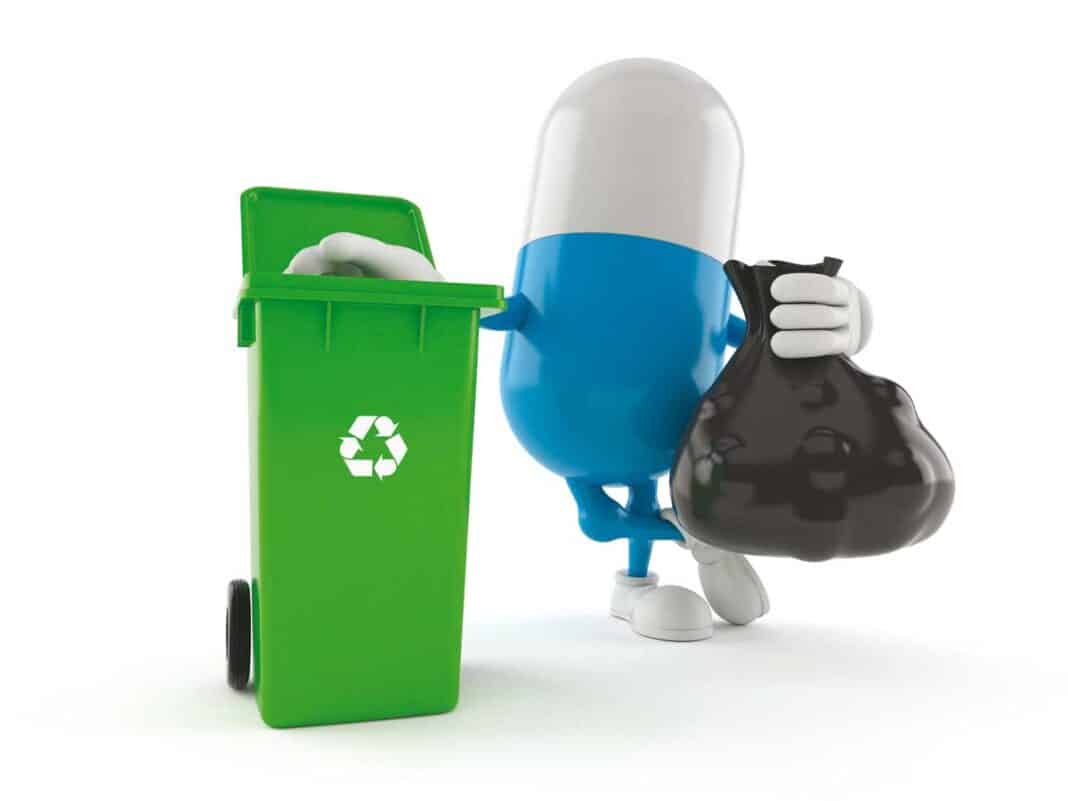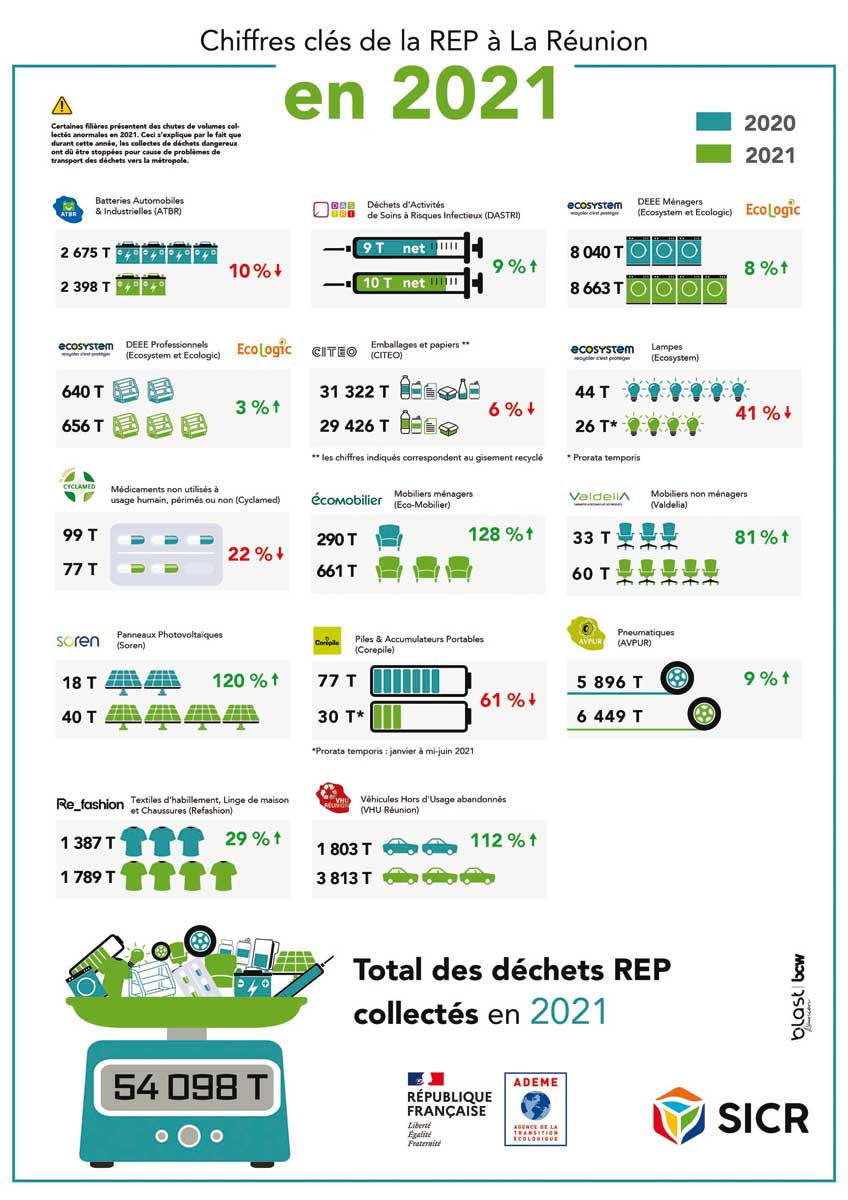54,098 tonnes of waste were collected in 2021, in a context still marked by the double health and economic crisis. The latest assessment of extended producer responsibility sectors (REP) shows a slight increase in the overall volume of waste collected.
For over ten years, the Réunion Import and Trade Union (SURE) done every year, in collaboration with ADEME, an inventory of the volumes of waste collected in the territory. In 2021, the overall volume of waste collected within the framework of REP sectors stood at 54,098 tonnes, compared to 52,468 tonnes in 2020*. “This 2021 assessment is satisfactory. Indeed, despite the cessation of collections due to problems with the export of hazardous waste for certain sectors, the collection rate shows an overall increase of 3%”, judge Fabrice Hanni, president of the SICR. “This slight increase is explained in particular by the significant deployment of certain sectors in the territory. Eco-organizations work hard throughout the year with their stakeholders to make small territories like Reunion Island a benchmark for the circular economy in the Indian Ocean.”, comments Martine Hippolyte, facilitator of the SICR REP inter-sector platform. “We therefore encourage all players who are not yet there to integrate the REP sector system, whether in terms of prevention, waste management or recovery”, complete Sandrine Sinapayel, environment manager at SICR.
Collection rates on the rise
Several sectors are seeing their collection rates explode in 2021 for various reasons. The very young sector of abandoned end-of-life vehicles (VHU), operational since 2020, logically experiencing a very strong increase in its tonnage collected. The same goes for the eco-organization Éco-Mobilier which, by developing its collection network, increases its volumes.
The increase in the collection rate of solar panels managed by the eco-organization Soren can be explained, she, by the renewal of a certain number of panels with more productive materials. For the textile sectors (Refashion), healthcare waste with perforating infectious risk (Dashtri) and professional furniture (Valdelia), the progression of collections can be explained, largely, by the return of good practices in the post-Covid-19 period. Finally, it is worth noting the start this year of ECODDS, the household hazardous waste disposal sector, which is set up through Rekulpo sites where users can get rid of their waste of solvents and paints and other acrylic-based products.
Collection rates falling
* The overall tonnage of waste from REP sectors in 2020, initially estimated at 64,459 tonnes, was subsequently revised downward.
TWO NEW ECO-ORGANISMS AT REUNION
1 . ATBR (automotive and industrial accumulators), local eco-organization.
2 . AVPUR (used tires),
local eco-organization.
3 . CITEO (household packaging and graphic papers), national eco-organization.
4. Corepile (portable batteries and accumulators), national eco-organization.
5 . Cyclamed (unused medications, for human household use, expired or not), national eco-organization.
6. Dashtri (waste from healthcare activities with infectious and similar perforating risks), national eco-organization.
7 . EcoDDS (household hazardous waste), national eco-organization.
8 . Ecologic (WEEE, sports and leisure articles, thermal DIY and garden items), national eco-organization.
9 . Eco-furniture (household and professional furniture), national eco-organization.
10 . Ecosystem (Household and professional WEEE and lamps),national eco-organization.
11 . PYReO (maritime safety pyrotechnic products), national eco-organization.
12 . Refashion (clothing textiles, linens and shoes), national eco-organization.
13 . Soren (photovoltaic panels),
national eco-organization.
14 . Valdelia (non-household furniture),
national eco-organization.
15 . VHU Réunion (abandoned end-of-life vehicles), local eco-organization.
5,000 TONS OF HAZARDOUS WASTE ON THE ROUTE TO THE METROPOLIS
Batteries, piles, used oils, hydrocarbon sludge, solid and liquid acids, lead glasses, photovoltaic panels, drugs, soiled materials and packaging, etc. Since June 2021, hazardous waste has accumulated on the platforms of waste collection and storage operators as well as in certain companies. The global disorganization of maritime traffic, caused by the health crisis, then conversely the strong demand for freight following the vigorous economic recovery, created major difficulties regarding the possibility of exporting this waste to mainland France. A year ago already, the Réunion Import and Trade Union alerted to this situation by presenting the results of the REP sectors in 2020. The absence of a direct line with the mainland and the regulatory constraints of the Basel convention, which governs the cross-border movement of hazardous waste during stopovers, added to the lack of availability of boats. This resulted in an overstocking of waste, particularly hazardous waste, on operator sites whose saturation has led to the cessation of collections.
A unique operation
The boat chartered by the company Mer Union took on board 222 containers of waste in Reunion and 23 containers in Mayotte. The trip is non-stop to Le Havre, avoiding the complications of prior consents required for ship calls by the Basel Convention. Upon their arrival in mainland France, this waste will be sent to their respective elimination channels, as was the case before. Mer Union is a conventional goods transport company (excluding containers) which regularly serves, in the Indian Ocean, Comoros and Reunion. It joined forces for this exceptional operation with EAS International, freight forwarder specializing in the transport of hazardous waste. The operation for a total amount of 2,6 million euros benefited from aid from the Réunion region of 800,000 euros taken from the envelope of the European regional development fund (FEDER). The time has now come to look for a more sustainable solution that would allow a gradual return to normal in the shipment of hazardous waste from Reunion Island..













